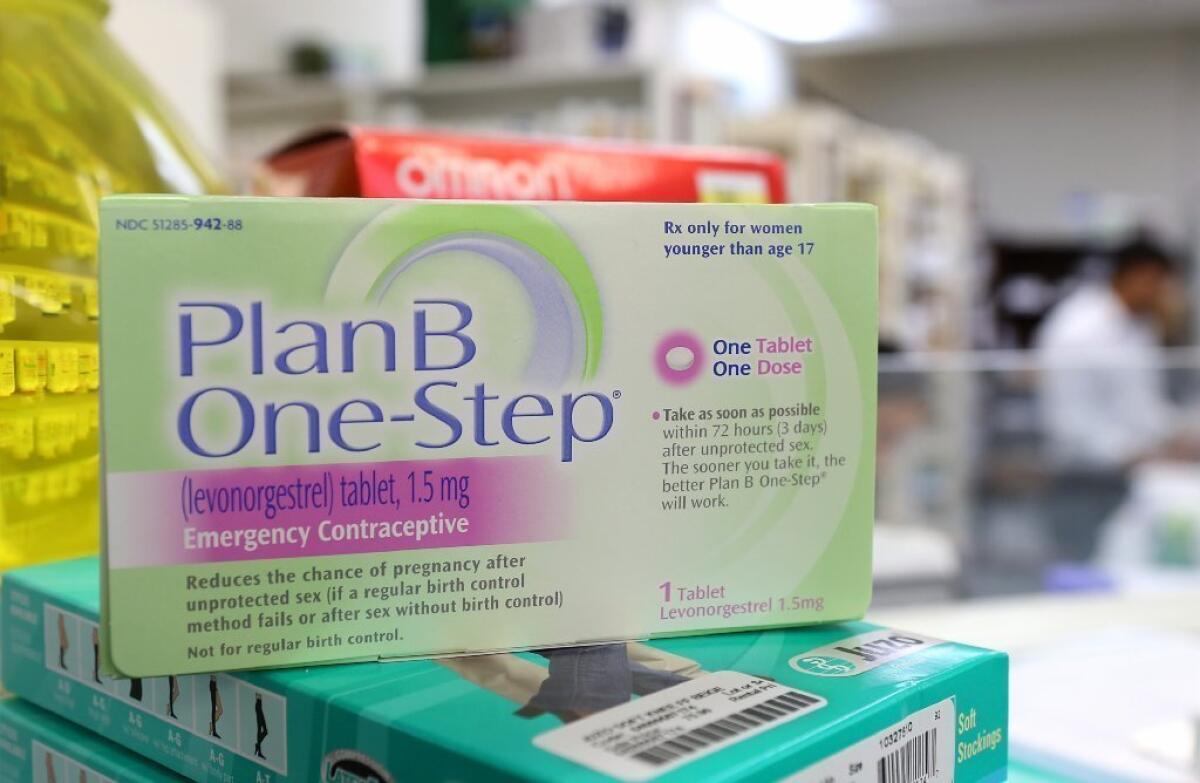With FDA approval, fight ends over morning-after pill

- Share via
The Food and Drug Administration on Thursday approved the emergency contraceptive Plan B One-Step for use without a prescription or age restrictions, effectively ending more than a decade of legal and regulatory wrangling over the controversial morning-after pill.
In a statement, the FDA said its action complied with an order by U.S. District Judge Edward Korman of New York, who had openly criticized the George W. Bush and Obama administrations for imposing restrictions on the sale of the pill for political reasons.
Last week, Korman gave grudging approval to a proposal from the FDA and the Department of Health and Human Services to approve Plan B One-Step for over-the-counter sales, but not other versions of the drug.
“Over-the-counter access to emergency contraceptive products has the potential to further decrease the rate of unintended pregnancies in the United States,” read Thursday’s statement from Dr. Janet Woodcock, director of the FDA’s Center for Drug Evaluation and Research.
Plan B One-Step, which is manufactured by the Israel-based pharmaceutical firm Teva, retails for about $60 a dose. It contains the synthetic hormone levonorgestrel, which blocks ovulation and impedes the mobility of sperm. It will not work if a woman is already pregnant, nor will it harm a developing fetus.
A two-pill version of the drug, also manufactured by Teva and called simply Plan B, was not included in the FDA’s approval.
On Thursday, reproductive rights groups welcomed news of the action.
“It’s about time,” said Chris Iseli, a spokesman for the Center for Reproductive Rights. “It’s taken too long to bring emergency contraception out from behind the pharmacy counter.”
The center represented plaintiffs in a suit against the government charging that age requirements and point of sale restrictions were unfairly blocking access to a drug that was as safe as aspirin and should be available to women of all ages.
Iseli acknowledged that plaintiffs had hoped to win access to all versions of the drug, particularly cheaper generic varieties, but said Thursday’s approval was a significant victory.
Although the FDA has officially removed restrictions on the drug’s sale, the change does not take effect immediately. Packaging on the product must be changed to reflect the new rules, and old stock now in pharmacies must be sold according to the old rules. It could take weeks to months before the newly packaged drugs are available, and there is likely to be confusion among consumers and sales clerks.
In 2011, the FDA was poised to approve the drug’s sale without a prescription, but that decision was overruled by Heath and Human Services Secretary Kathleen Sebelius, who, along with President Obama, voiced worries that open access would allow girls as young as 10 or 11 to buy the drug as easily as “bubble gum or batteries.”
On April 5, Korman ordered that all levonorgestrel-based emergency contraceptives be available over the counter without a prescription, and gave the government 30 days to comply.
Instead of removing all restrictions, however, the FDA responded with new guidelines lowering the minimum purchasing age from 17 to 15. It also required that purchasers show an ID. At the same time, the U.S. attorney’s office, which represented the FDA and the Health and Human Services Department in court, filed an appeal of Korman’s order.
Korman refused to alter his order, however, and the government responded by saying it would approve Plan B One-Step and drop its appeal.
In accepting that offer last week, Korman voiced concern that the FDA might grant “marketing exclusivity” to Teva, essentially giving the drug manufacturer a three-year monopoly on the sale of non-prescription emergency contraceptives. Federal law permits the FDA to grant such exclusive agreements to drug firms that fund and conduct clinical trials that are deemed essential to the drug’s approval.
Korman wrote that such exclusivity would “only result in making a one-pill emergency contraceptive more expensive and thus less accessible to many poor women.”







